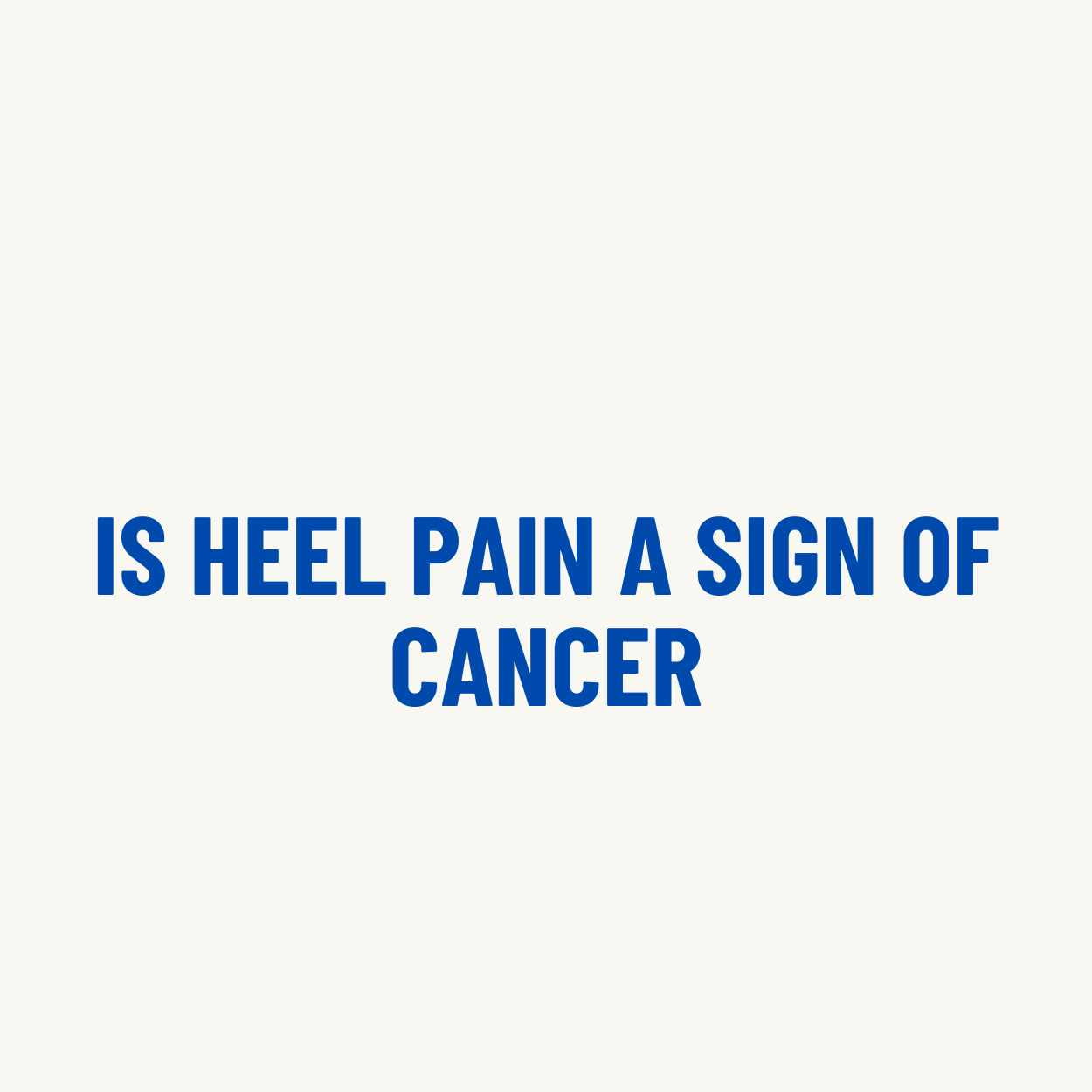Is Heel Pain a Sign of Cancer?: Heel pain is not commonly a sign of cancer. Other causes, like plantar fasciitis, are more likely.
Experiencing heel pain can be an uncomfortable and disruptive symptom for many individuals. While it’s rare for heel pain to indicate cancer, it is essential to determine its root cause. Conditions such as plantar fasciitis, Achilles tendonitis, and bursitis are often responsible for heel discomfort.
People who regularly engage in vigorous activities or those who have experienced recent increases in physical activity may find themselves particularly susceptible to such issues. Diagnostic clarity becomes important to ensure the correct treatment path is followed. Consulting with a healthcare professional can lead to an accurate diagnosis, ruling out the possibility of cancer and focusing on common, manageable causes. Early intervention can prevent the condition from impacting daily movements and overall quality of life.


Credit: www.hmpgloballearningnetwork.com
Heel Pain Prevalence And Primary Causes
Heel pain affects numerous individuals daily. Various factors contribute to this discomfort. Plantar fasciitis is a typical trigger, characterized by inflammation of the tissue connecting the heel bone to the toes. Another common contributor is Achilles tendinitis, involving the tendon that connects the calf muscle to the heel.
People may also experience heel pain due to stress fractures, overuse injuries common in athletes. Moreover, Heel bursitis and heel bumps are possible causes; the former involves inflammation of the bursa at the heel, while the latter refers to excess bone growth. Finally, tarsal tunnel syndrome, a nerve compression issue near the ankle, can lead to heel discomfort.
| Etiology | Description |
|---|---|
| Plantar Fasciitis | Inflammation of tissue connecting heel and toes |
| Achilles Tendinitis | Tendon inflammation connecting calf to heel |
| Stress Fractures | Overuse injury causing cracks in bone |
| Heel Bursitis | Inflamed bursa at the heel |
| Heel Bumps | Excess bone growth on the heel |
| Tarsal Tunnel Syndrome | Nerve compression near the ankle |
Cancer’s Role In Musculoskeletal Pains
Heel pain can suggest various conditions, including cancer. Bone cancers, such as osteosarcoma, might manifest in feet. It’s crucial to recognize that heel pain due to cancer is rare. Most heel pain results from less serious issues, like plantar fasciitis or heel spurs. Yet, with secondary cancers, which are cancers that have spread from another part of the body, the heel might be affected. Metastasis to the bone can cause significant pain and discomfort.
Identifying cancer-related heel pain involves looking for other symptoms. These might include swelling, increased pain at night, and pain that doesn’t improve with rest. Weight loss and fatigue are other common cancer signs. Seeing a doctor for persistent heel pain is important. They can determine if cancer is a concern.
Symptom Profiling: When To Be Concerned
Heel pain often comes from stress or injury. Cancer is rarely a cause. Still, certain signs need attention. Persistent pain, even without weight on the foot, is a red flag. A feeling of a lump inside the heel may mean more than injury. Night pain that interrupts sleep can also be concerning.
Notice any swelling or changes in skin color. Sudden heel pain% without an injury should alert you. Pain that doesn’t improve with rest should be looked at. If treatments like ice or painkillers don’t help, check with a doctor.
| Symptom | Possible Red Flag for Cancer |
|---|---|
| Unrelenting pain | Yes |
| Heel swelling | Consider |
| Change in color | Monitor |
| Pain without pressure | Get checked |
| Lump in heel | See a doctor |
| Sleep disruption | Could be significant |
Diagnostic Journey For Persistent Heel Pain
Diagnosing heel pain often starts with visits to your primary care provider.
They may check for common causes like injuries or arthritis. Often this includes a physical exam and asking about your health history.
If heel pain persists, specialists like podiatrists or orthopedists may join your care team. They could recommend advanced scans such as MRI or CT.
Sometimes, they might take a small piece of heel tissue, a biopsy, to examine closely. This can help rule out serious problems like cancer.
These steps can shed light on the cause of your heel pain and ensure you receive the right treatment.
Treatment Approaches And Prognosis
Heel pain can arise from various causes. Cancer-related heel pain requires special attention. Treatment typically involves multiple experts. This is known as interdisciplinary management. Oncologists, pain specialists, and palliative care teams often collaborate. Their goal is to reduce pain and improve quality of life.
For those without cancer, heel pain may stem from issues like plantar fasciitis or Achilles tendinitis. Treatment often includes physical therapy, orthotic devices, and in some cases, medications. Proper diagnosis is vital to tailor supportive care effectively. This care is crucial for maintaining daily activities and foot health.


Credit: www.cardiacwellnessinstitute.com
Preventive Measures And Ongoing Research
Lifestyle changes can help lower heel pain. Wearing properly fitted shoes is key. Shoes should support your foot arch and cushion heels. Avoiding high heels and tight shoes is a good step. Make sure to walk on soft surfaces. Exercise can also reduce pain. But, choose low-impact activities like swimming or cycling.
Scientists are studying the heel pain and cancer link. Recent research does not make a clear connection. Yet, ongoing studies may reveal more about the link. Keep informed with the latest studies. This knowledge can help in understanding heel pain causes.


Credit: www.umc.edu
Frequently Asked Questions Of Is Heel Pain: A Sign Of Cancer
What Kind Of Cancer Causes Heel Pain?
Heel pain can be caused by certain types of cancer, such as bone metastases from primary malignancies like breast, prostate, and lung cancer. Osteosarcoma, a type of bone cancer, can also result in heel pain.
What Are Red Flags In Heel Pain?
Red flags for heel pain include severe swelling, discoloration, inability to walk, persistent symptoms beyond a few weeks, and pain at rest. Immediate medical evaluation is recommended for these symptoms.
What Causes Heel Pain In One Foot?
Heel pain in one foot often stems from plantar fasciitis, Achilles tendinitis, or a stress fracture. These conditions result from overuse, improper footwear, or sudden injury.
Can Heel Pain Be A Sign Of Something Serious?
Heel pain can sometimes indicate a serious condition, such as plantar fasciitis or Achilles tendonitis. Persistent or severe pain warrants medical attention to rule out fractures or arthritis.
Conclusion
Understanding heel pain is crucial for maintaining foot health and overall well-being. While cancer is a rare cause, vigilance is key. Always consult with a healthcare provider to rule out serious conditions. Timely diagnosis can lead to effective treatments, ensuring a pain-free, active lifestyle.
Remember, awareness is the first step to recovery.

